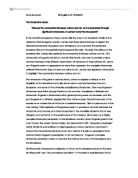When an individual takes personal responsibility, the individual admits he is the one responsible for the choices he makes. Other people or events are not responsible for the way an individual thinks and feels. It is the individual’s life, and the individual is in charge of it. The individual is not responsible for all that happens to him, such as the consequences of decisions, but the individual is responsible for how he thinks, feels, and acts when they happen. One is aware of his situation and is willingly accepting the consequences of his decisions, even if they are personally harmful. One understands and recognizes his personal control over any matter. Personal responsibility is necessary in existentialism because the individual has no predetermined nature and if free to choose his fate. For example, in Oedipus Rex, Oedipus concludes “all is well” despite his personal suffering as a result of killing his father and marrying his mother. Oedipus accepts his fate of being banished from the kingdom and takes personal responsibility for his actions. He abandons hope in his struggles in order to get by.
The importance of a decision depends on scope. In other words, the greater the value of a decision affects more individuals based on the individual‘s rise in social structure. However, minimal scope can occur if the decision is limited to one individual rather than a broader number of beings. Decisions, according to existentialists, must be well-thought out for them to affect others. Take the organizational structure of a business company, for example, at the bottom is a janitor, above him is a high rank officer, then a range of executives, and so on… up to a chief executive officer. The choices that the janitor makes does not necessarily influence other individuals within the company; he is primarily responsible for cleaning and to maintain the offices. Yet chief executive officer has greater influence on the individuals around him due to his elite position unlike the janitor. The chief executive officer’s actions take on more value because of a broader scope than a person of low social ranking like the janitor.
To existentialists, freedom of individuals is essential. It is known in existential philosophy that an individual has personal control over his fate, the individual has no predetermined nature. An existentialist values this right to exercise free will, hoping to advertise and uphold the freedom of others through expression and taking action. Existentialists promote freedom. Their decisions do not necessarily have to be “right,” what they are promoting does not also have to be always good. The good decision can benefit a majority of people. Ethical principles are influenced by the number of people negatively affected. The impact upon the freedom of other individuals can be reduced by a good decision. An existentialist examines and overanalyzes a situation. One freedom debate is over gay rights. While certain individuals oppose gay rights in the name of Him, those in favor promote freedom and equal acceptance. Their support protects the greatest number of people who desire gay rights.
Personal freedoms and the right to exercise them are restricted by social structures. To existentialists, situations that allow an extensive range of personal choice are primary. Since situations vary, existentialists are aware that some compromises are necessary to exercise their freedom. Existentialists try to avoid disruption of society while seeking to allow freedom of expression to everyone. Existentialist do not tolerate limited personal freedoms. Their intent is to express openly of their opinions against this restriction. One essential quality in an existentialist is being an active fighter for greater freedom. Hayden Panettiere, for instance, was involved in a violent confrontation with Japanese fishermen as she tried to disrupt their annual dolphin hunt in Taiji, Wakayama. She paddled out on a surfboard, with five other surfers in an attempt to reach a pod of dolphins to stop them being driven into a nearby cove and killed. Panettiere actively fought for the freedom of others, dolphins.
In existentialism, death is accepted freely. In some cases, death seems like the most logical and ethical ultimate choice. For example, in Antigone, Antigone proudly accepts her death as she sees no wrong in honoring her unwept, "unburied" brother. She then kills herself, willing to make the “ultimate sacrifice” to protect the name of her wronged brother.







